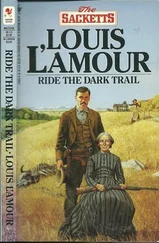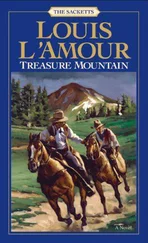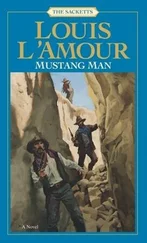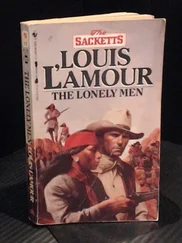He wiped a smear of sweat and blood from his face. "I wanted no trouble," he said, "and he sent trouble to me." Jean LaBarge lifted a hand. "Ben!"
Turk slid a pistol behind his belt and tossed a bowie knife. Jean caught it in mid-air and faced the crowd. "Anybody else? I'll open any of you lads to the brisket if you want to back the Yankee's fight." Nobody spoke. Jean held the knife low, cutting edge up. Somebody sighed and shifted his feet and LaBarge turned to Denny O'Brien. The saloonkeeper had never seen steel that looked so sharp, and he was a man who had seen many knives, and seen them used.
"I've a thought, Denny O'Brien, that you've taken some Russian money. Don't ever spend it, Denny, for I'll hear of it and have your heart out and lying on your own bar. You hear me, Denny?"
O'Brien, swallowed, muttering something inaudible. Jean flipped the point of his knife ... once, twice. Each move slashed a suspender and O'Brien's trousers fell around his boots, yet he did not move, breathing hoarsely, knees trembling, his face yellow-sick. Sweat stood on his brow and cheeks, it dripped from his fat chin.
Jean continued to smile, a wolfish smile that turned O'Brien's insides to jelly. With flick after flick of the knife he took the buttons from O'Brien's waistcoat. It was a moment long-treasured on the coast, a story told many times in Sydney Town, and in the fo'c'sles of many a ship outward bound. It was a story men loved to hear, of the click of falling buttons and the sweat dripping from O'Brien's fat jowls.
"And Denny," LaBarge warned, "tell Charley Duane to be careful. Tell him if he crosses me again he'll be getting his tail in a crack. You hear me, Denny? You tell him that."
Chapter 11
By noon of the following day the story of the battle at O'Brien's was being repeated in excited whispers in every boudoir on Rincon Hill, where the name of Jean LaBarge was well known in other fields of endeavor. At the Merchant's Exchange they could talk of nothing else, and the click of those falling vest buttons was heard wherever even two people happened to meet. Count Rotcheff even found a brief reference to the fight in his Alta Californian. "Your friend LaBarge seems to possess a variety of talents," he suggested.
Helena looked up quickly. "The maid told me while I was having my bath." She paused. "She also told me something else. There is a rumor the original attack was paid for by a Russian."
Rotcheff rustled his paper angrily. "The man's a fool! Why would he get involved at a time like this?"
Helena put down her cup. "Do you actually believe he would do something of that kind merely because he was angry?"
"You think it was done because LaBarge was to sell us wheat? But why would he do that? The wheat was for the Company."
"And we both know he is interested in a new charter, for another company."
He was too trusting--though not of foreign diplomats, only of his own countrymen. It was a fault from which all the Russian liberals suffered. Alexander knew how to cope with duplicity, but the Renaissance type of violence used by Paul Zinnovy was beyond the realm of his consideration; this Helena told herself. Her husband was a gentle man, and Paul Zinnovy was cold, efficient, deadly. "Another thing," she warned, "you must yourself be careful. Paul wants two things: to get a charter for the new company and to return to St. Petersburg with a brilliant coup behind him. You stand in the way of both goals." She put her hand on his. "Alexander, you must be very careful! Your report can ruin him, and he knows it!"
Kotcheff shook his head. "You exaggerate, my dear. He would not dare use violence against anyone as close to the Czar as I am." "You are a thousand miles or more from any Czarist official, you are many thousands of miles from St. Petersburg. Who is to know what happens out here?" Somehow the idea had not occurred to him, yet instantly he saw that she was correct. He was far from the capital and no longer young, and accidents could be arranged. If he were murdered out here it would be months before the Czar even heard of it, and years before any investigation could be conducted to a conclusion. For the first time he was uneasy, less for himself than for Helena. "Why, Alexander, was Paul Zinnovy sent here? Stop for a moment and think of that."
"He was in trouble"--Rotcheff was worried now--"and of course, he is a capable officer."
"Do you remember Paul's last duel? Rodion announced he was going to demand an investigation into some of the Company affairs, and three days before he was to appear before the Czar he was challenged to a duel by Zinnovy over some fancied slight. And Rodion was killed."
Rotcheff was silent. There was much to be said for Helena's interpretation of the situation although he was hesitant to admit that Paul Zinnovy might have been sent out for the express purpose of removing him. Three groups were involved in the affairs of Russian America. The Grand Duke's party, of which he was one, wanted to sell the territory of Alaska to the United States, if they could be induced to buy. The Russian American Company were bleeding the Indians white to pay dividends, but they were also bleeding their own stockholders and the government as well. The third group, of whom some were stockholders in the present company, wished to secure the lucrative charter for their own group who were establishing a new company with even greater dividends in prospect. Suppose he were murdered by a drunken native? Or fell overboard in a storm? Or was suddenly taken ill? Who but Zinnovy would prepare the report? Even at Sitka, it would be Rudakof, who would do what Paul Zinnovy told him. Count Rotcheff knew that if the investigation he was conducting brought out the evidence the liberal party believed it would, if it substantiated the complaints the government had received from parties in or visiting Russian America, then the Company's charter would not be renewed nor would another be granted. "Helena," he said abruptly, "I believe you should return to St. Petersburg. If the situation is as serious as you believe, this is no place for you." "On the contrary, it is all the more reason I should be with you." She glanced over her teacup. "Have you thought of Jean LaBarge? He might help us."
In his rooms, Jean sat over the books spread out on the table before him. He ran a finger over a small map, searching for Kootznahoo Inlet. He had checked all the reports of furs bought in San Francisco in the last four months and nothing had come from Kootznahoo. He listed it as a likely call, then added four more names to the list.
This first trip must be fast. The places he visited must be near the accepted route but where he could lie at anchor in concealment, and every stopping place must have more than one opening so that if discovered he could get out fast. The deal for the schooner had been consummated, the rifles, ammunition and trade goods had been loaded. Kohl wasted no time, and the schooner was a tight, shipshape craft, easily handled and loaded. She would carry but one gun, and despite her strength and capacity she was a "light" ship with none of the bulky, overweight gear that characterized so many ships. The sour-faced man who had been in the saloon at the time of the Sullivan fight appeared and was signed on as second mate, and the last two members of the crew were signed. Gant was a broad-built man, and Boyar was tall, stooped in the shoulders, and spoke fluent Russian.
Kohl looked at him without favor. "You a Russky?" "I'm a Pole. But I worked for the Company." Kohl turned to Jean. "Cap'n, you sure you want this man?"
LaBarge turned. "Take off your shirt, Shin." Shin Boyar shucked off his shirt and turned his back for Kohl and Captain Hutchins to see. Scars lay like livid bands across his back, scars like twisted cords of white. Kohl glanced at them, then at Boyar's face.
Читать дальше












